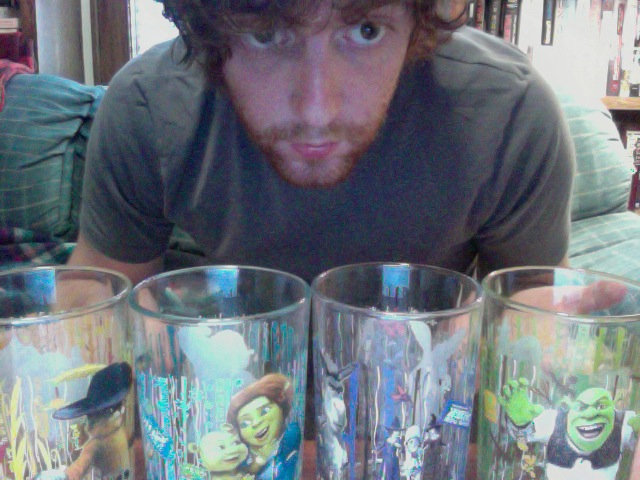Book Learnin' (Part 1 of ?)
 Tuesday, July 20, 2010 at 04:59PM
Tuesday, July 20, 2010 at 04:59PM I have never considered myself a particularly well read person. I would say that I am well watched. I would say that I am well listened. Well played, perhaps. Yet the well read tag has always eluded me.
A professor of mine once said that Samuel Taylor Coleridge was the last person to have read every book he could, quite literally, get his hands on. I am not sure whether that statement has any grounding in reality. Like the old "there are more people alive right now than have ever died" myth, I'm not going to dispute it but it's still hard to accept (perhaps because the latter isn't true at all, not even close).
Anyway, none of this would matter if not for the fact that I am a writer of things and an instructor of the writing of things. In just a little over a month I will be back in the classroom teaching four (!) sections of English Composition. As is only natural for a poorly read (?) chap such as myself, sometimes I feel a bit ill-equipped for the position. This insecurity, stemming from the amount of shoddy grammar you might see peppered throughout these blog posts, is only amplified by a lack of literary latitude (now if only an overly alliterative mind could offset things!). This summer, however incrementally, I am aiming to change that fact.
Which brings me to Blood Meridian, Cormac McCarthy's 1985 saga of a whelp and some scalps. Blood Meridian is one of those books, like Infinite Jest or the Bible (which may have further unlocked certain scenes within), that I was embarrassed for not having read. I'm not sure I had ever heard of the book (though I had heard of its author, certainly) until attending an MFA program in the heart of the southwestern United States. The fiction folks were all Cormac McCarthy (writes about the Southwest) this, David Foster Wallace (our most famous alum) that. It was a loaded situation, to be sure. As a poetry dude, I preferred to immerse myself in the University of Arizona Poetry Center's collection of small-press, 21st Century works, the one area where I do feel fairly erudite. But today I must say that I am a happy little novitiate in the cult of McCarthy, because I think this book pretty much rules.
Since I just finished the novel this afternoon, I can't begin to address it in a more global sense. Instead I'd like to mention my most immediate takeaway, my admiration for McCarthy's craft and, more specifically, his diction. Though esoteric language is not a prerequisite for my enjoyment of a particular text, I do appreciate writing that poses some degree of lexical difficulty. To put it another way, I like being driven to the dictionary. I relish it. The fact that I don't know the meaning of "manciple" or can't begin to translate the Spanish dialogue (and I admire McCarthy for this refusal, certainly putting some of his readers in the Kid's boots) makes me want to learn more and thus become a better reader for this book and others.
In the summer of 2007 I was reading Ange Mlinko's second collection of poetry, Starred Wire. I thought the book was great and all but I was having trouble "getting it." I should note that this was before I realized that "getting it" isn't what poetry (especially poetry that is lyric) is really about. The difficulty was, in part, a lexical one: so many words that were foreign to me. Incunabula? Faience? Volute? Rather than skip over them, I decided to consult the dictionary whenever I encountered a word that I did not know. Novel, right? Now this method does not suit all reading styles. It leads to a lot of stop and start reading, and I have since tweaked my own process so as to manage such choppiness. But in this way my "New Words" list was conceived, the kind of file I imagine most writers without the benefit of photographic memory must have stashed away somewhere.
As I finished my 337th page of Blood Meridian, my "New Words" list finally hit a full 100 pages. At roughly 20 words per page depending on the length of the definition (I copy definitions down, too), that's about 2,000 words I can add to my vocabulary. Sort of. Of those 100 pages, I would say that words learned from Blood Meridian count for about 15. Most of those words relate to the vernacular of the 19th century Southwest, geography, and horses. There's also some legalese and poetic/biblical language in there, as well as words from some surprising registers. Here are my ten favorite as of right now. In alphabetical order, of course:
1. Banderilla: A decorated dart thrust into a bull’s neck or shoulders during a bullfight.
2. Catafalque: A decorated wooden framework supporting the coffin of a distinguished person during a funeral or while lying in state.
3. Charivari: A cacophonous mock serenade, typically performed by a group of people in derision of an unpopular person or in celebration of a marriage.
4. Enfilade: A volley of gunfire directed along a line from end to end; A suite of rooms with doorways in line with each other.
5. Knacker: A person whose business is the disposal of dead or unwanted animals, esp. those whose flesh is not fit for human consumption.
6. Leechcraft: The art of healing.
7. Mollycoddle: Treat (someone) very indulgently or protectively; An effeminate or ineffectual man or boy.
8. Suttee: The former Hindu practice of a widow immolating herself on her husband’s funeral pyre.
9. Suzerain: A sovereign or state having some control over another state that is internally autonomous.
10. Whang: Make or produce a resonant noise.
I think these are my top ten on account of a perceived physicality, be it of the sonic or denotative (hell, or connotative) variety. They seem to fit with one of the manuscripts I am fiddling with under its current working title of Carrion Luggage. Now how to fit them in? It has to be organic, right? Not word porn? And what happened to my initial discussion of what it means to be or not to be well read? Will there be a "Book Learnin' (Part 2 of ?)?" Will I ever stop ranting? Will I ever place a nice bow on one of these posts or will I continue to devolve into questions as a way to prevent finger sprain?
 Zach Buscher
Zach Buscher
Apparently it's Cormac McCarthy's birthday. He is 77 years old today. Uh, wow, I had no idea. Here's to many more years (and books) to come!



